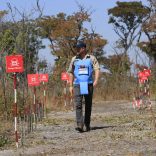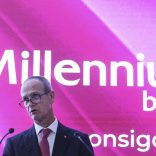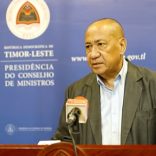Portugal's ruling centre-right alliance wins election, but far-right makes record gains
Cabo Verde hosts IMF / World Bank African Caucus

The island of Sal, in Cabo Verde, is hosting the 2023 African Caucus, an annual meeting that brings together finance ministers and central bank governors from across Africa with officials from the International Monetary Fund and World Bank.
The agenda of the gathering – which is on the theme ‘New modalities and mechanisms to finance economic development in Africa’ – includes several meetings and discussion sessions, with Thursday’s programme featuring an International Finance Corporation event on ‘Development of green and sustainable debt markets in Africa’.
Green debt is a type of sovereign debt issuance that serves to finance projects specifically related to environmental, social or development objectives, and is cited by analysts as a very promising market for countries in Africa, given the pressing environmental concerns among international investors and institutional pension funds.
On Friday, the main day of the event, the African Caucus included several sessions, including a presentation by the director of the IMF’s Africa department, Abebe Aemro Selassie, on financial constraints in the region, and a session on ‘Public debt as a financing instrument for growth in Africa within the new global financial architecture’.
Still on Friday, there was a session dedicated to formalising the informal economy, based on Angola’s experience in this area, and another session on unlocking green financing for Africa.
African Caucus: Ulisses Correia e Silva defende reforma do Banco Mundial ajustada aos novos temposhttps://t.co/e3QCGjGaDI pic.twitter.com/TnV6kck5l6
— Inforpress (@InforpressCVP) July 7, 2023
On Saturday, the final day of the African Caucus, officials from the participating countries and institutions are to gather before making public a Sal Declaration, before the gathering is closed by Cabo Verde’s deputy prime minister and minister of finance, Olavo Correia.
Cabo Verde was chosen over a year ago to chair and host this African Caucus, a meeting that has been held since 1963 and brings together ministers of finance and planning and central bank governors from Africa with IMF and World Bank officials.
The African Caucus meets twice a year, the first time in the host and chair country – with Cabo Verde having this year succeeded Morocco, which oversaw the event in 2022 – and the second time in Washington, the headquarters of the IMF and World Bank.
I look forward to participating in the African Caucus this week in #CaboVerde to discuss the private sector’s critical role in addressing the challenges & opportunities ahead, from the green economy to the potential of digital technology & greater trade & regional integration. pic.twitter.com/3CMivFU7Vr
— Sergio Pimenta (@SPimentaIFC) July 6, 2023
The African Caucus was established in 1963, with the objective of strengthening the voice of African Governors in the Bretton Woods Institutions (BWIs), i.e. the International Monetary Fund (IMF) and the World Bank Group (WBG), on development issues of particular interest to Africa. Membership to the Caucus is open to all African Countries who are members of the IMF and WBG, currently all the 54 countries on the African continent. The countries are represented by their respective Governors at these institutions, commonly referred to as the African Governors, who are usually Ministers of finance and economic development, and Central Banks Governors. Views and concerns of African Governors are conveyed to the heads of the BWIs through a Memorandum and that is done annually at the Annual Meetings of the two institutions.
The African Caucus meets twice yearly; first, in the host country of the Chairperson of the Caucus and secondly, at the venue of the Annual Meetings of the IMF and WBG.
FINANCE MINISTER @S_Musokotwane IN CAPE VERDE FOR THE IMF/WBG AFRICA CAUCUS – https://t.co/ZtkRpaz1md pic.twitter.com/BwemsRGaxJ
— Ministry of Finance & National Planning – Zambia (@mofnpzambia) July 7, 2023













Leave a Reply
Be the First to Comment!
You must be logged in to post a comment.
You must be logged in to post a comment.